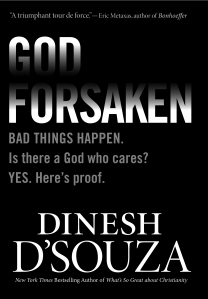I heard this song years ago. Its message still hits me, especially this week, which officially ushers in a season of transition and waiting. And I love Sara Groves’ music.
[vimeo http://vimeo.com/5045335]
What’s Egypt look like for you?
Stories of grace for life's unexpected turns
I heard this song years ago. Its message still hits me, especially this week, which officially ushers in a season of transition and waiting. And I love Sara Groves’ music.
[vimeo http://vimeo.com/5045335]
What’s Egypt look like for you?
“Bad things happen. Is there a God who cares? Yes. Here’s proof.”
 This subtitle to Godforsaken by Dinesh D’Souza, college president and noted apologist, itself is a lot to take in. Most of us have probably wondered something along these lines at one time or another. D’Souza is known for debating atheists on various subjects, so at first, I thought maybe this book was meant to convince those who don’t believe that there is indeed a loving God who cares about this messed-up suffering-filled world.
This subtitle to Godforsaken by Dinesh D’Souza, college president and noted apologist, itself is a lot to take in. Most of us have probably wondered something along these lines at one time or another. D’Souza is known for debating atheists on various subjects, so at first, I thought maybe this book was meant to convince those who don’t believe that there is indeed a loving God who cares about this messed-up suffering-filled world.
In part, that is his purpose.
What I didn’t expect was how mind-blowing and belief-altering his arguments would be for me.  D’Souza unapologetically uses science to defend a world where suffering is present. And the use of science doesn’t break the foundation of faith. In fact, it strengthens it. Science was not my favorite subject in school and I admittedly don’t think a lot about it now. What I learned in this book, though, renews my interest, especially in terms of how science and faith can work together. In the past I thought they were mutually exclusive. Not so. Science confirms creation. You’ll have to read it to believe it.
D’Souza unapologetically uses science to defend a world where suffering is present. And the use of science doesn’t break the foundation of faith. In fact, it strengthens it. Science was not my favorite subject in school and I admittedly don’t think a lot about it now. What I learned in this book, though, renews my interest, especially in terms of how science and faith can work together. In the past I thought they were mutually exclusive. Not so. Science confirms creation. You’ll have to read it to believe it.
In that way, and others, this is not an easy read. The way D’Souza thinks and writes wasn’t easy for me to read. My seminarian husband warned me that the book might be “thick.” It wasn’t that I couldn’t understand what he was saying; it’s that he writes the way I would assume he debates. He’s preparing a defense, shooting down arguments. That works for a debate. In a book, it’s a bit awkward and one-sided. He quotes many books written by atheists whom he’s debated, so we do get that side of the argument in a sense.
Godforsaken is no light read. It is beneficial, though, to atheists and believers alike.
FAVORITES: D’Souza’s revelations about the nature of suffering and the creation of the world rocked me in a good way. I appreciate books that challenge my previous assumptions and belief systems. I’m not sure I agree with everything he writes, but I’m interested in further study.
FAULTS: In the first 100 pages or so, the author spends a lot of time building up to what he’s going to tell us later. It was the slowest part of the book. When I got to his conclusions, I couldn’t put the book down. He has reasons for building up to his main point, but I almost gave up on the book before I got to where he was going.
IN A WORD: Challenging. This is the kind of book I’m going to need to go back and spend more time with. My husband took a class on suffering this semester, and I wish I had been reading it sooner in the semester so we could have talked about D’Souza’s claims in relation to what he was learning.
For another look at the book, check out the Godforsaken trailer.
——————-
In exchange for this review, I received a free copy of Godforsaken from Tyndale House Publishers through the Tyndale Blog Network.
————————————————
WE HAVE A WINNER!: Congratulations to Karen B. You won a copy of Discerning the Voice of God by Priscilla Shirer. E-mail me at lmbartelt(at)gmail.com with your address so I can send you a copy.
Lisa Bartelt is a participant in the Bluehost Affiliate Program.
Occasionally, I review books in exchange for a free copy. Opinions are my own and are not guaranteed positive simply due to the receipt of a free copy.